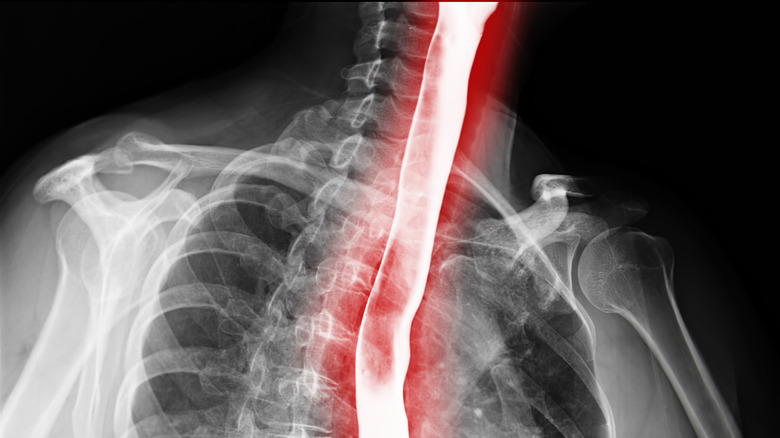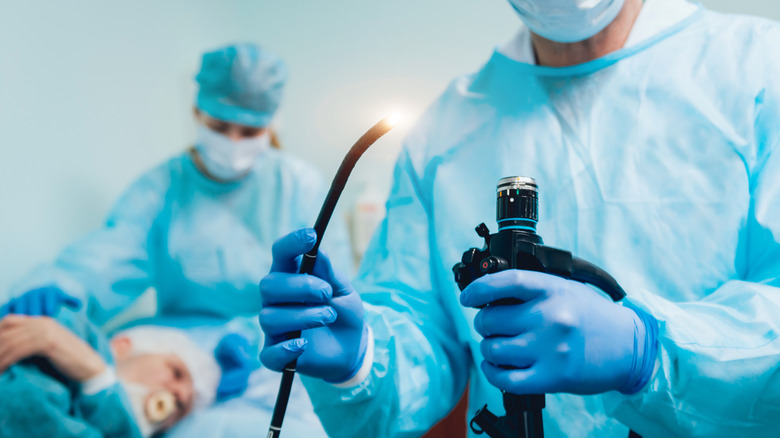What Happens To Your Body If Your Esophagus Ruptures?
On an average day, chances are that you don't even think about your esophagus. The esophagus, a muscular tube located behind your trachea, is designed to deliver food and liquids from your throat down to your stomach. When you ingest anything, muscular contractions push the food or liquid downward in a process called peristalsis. Once it reaches the lower esophagus, it is dropped into the stomach, where it begins the remainder of its journey through your digestive system (via Cleveland Clinic).
If everything is copacetic, your esophagus will do all the work without you even giving it a second thought. However, there can be occasional problems with the esophagus, such as heartburn or gastrointestinal reflux disease, commonly known as GERD. This occurs when the muscles of the lower esophagus don't close properly, allowing stomach acid to leak into the upper esophagus, potentially leading to damage (via MedlinePlus).
One of the most serious afflictions that can affect the esophagus is what's known as an esophageal perforation or rupture. If this happens, food, liquids, and saliva can spill out of the esophagus and into the chest and abdominal cavity. Although uncommon, a ruptured esophagus is a serious condition and may require immediate medical intervention (via UT Southwestern Medical Center).
How does the esophagus rupture?
There are a number of reasons why an esophagus may rupture. One of the most common causes is the result of tubes or instruments being inserted into the esophagus during medical procedures, such as an endoscopy. However, ruptures can also be caused by swallowing chemicals or foreign substances, ulcers in the esophagus, cancer, or trauma to the throat. Even overly straining while defecating can cause a tear (via Cedars Sinai).
Occasionally, a patient will suffer a spontaneous rupture in the esophagus, which can be caused by excessive vomiting or straining. This condition is known as Boerhaave's syndrome and occurs when the full esophageal wall is torn. If this happens, immediate medical attention is required, as it is a matter of life or death. Left untreated, Boerhaave's syndrome can lead to sepsis, shock, organ failure, and death (via Cleveland Clinic).
According to Healthline, if you suffer from a rupture in the esophagus, the first symptom you'll feel is pain, generally in the area where the tear is located. In addition, you will probably have trouble swallowing. You may also experience an increased heart rate, fever, chills, and bloody vomiting. Should any of these symptoms present themselves, your doctor will most likely order imaging to look for air bubbles or abscesses in the chest. These will be indicators of fluids leaking out from the esophagus.
How a ruptured esophagus is repaired
According to UT Southwestern Medical Center, not every esophageal tear requires surgical treatment. It is dependent on how large the perforation is and where it is located. Should treatment be necessary, there are a number of different options. Small tears can be repaired through endotherapy, where the tears are repaired with fibrin glue. A larger tear may require the insertion of a stent, although migration of the stents can be an issue. If the intra-abdominal portion of the esophagus is torn, it can lead to peritonitis or sepsis, so surgery is highly recommended in these cases (via Gastrointestinal Intervention).
In extreme cases, an esophagectomy may be needed. This is a procedure that removes all or part of the esophagus and reshapes your stomach to create a new one. This new esophagus is then joined with the remaining parts of the old one via staples or stitches (via MedlinePlus).
According to Healthline, the outlook for most perforedations of the esophagus is largely positive, provided you are able to receive treatment quickly. The first 24 hours are crucial and, as long as you seek treatment within that time frame, your chances of survival are reasonably high. However, the longer you wait, those chances decrease. If you feel any symptoms of an esophageal tear, such as having trouble breathing or swallowing — especially if you have just had surgery in that area — go to the hospital immediately.



